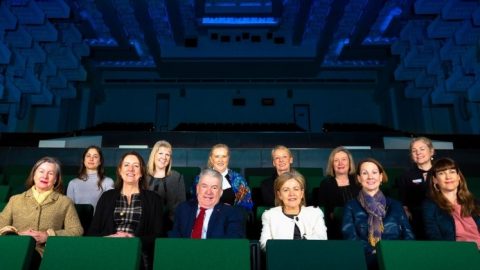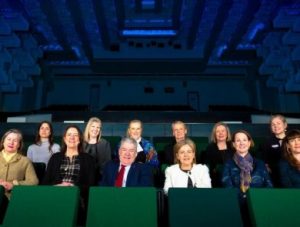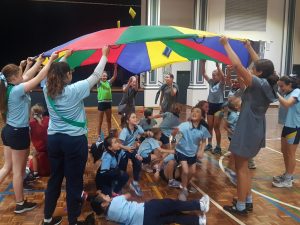Preparing Young Women for the Future Workforce

“Today’s school students are more likely to be employed as cyber security analysts than accountants tomorrow.” – RMIT University, 2019.
The Capitol Theatre, one of Melbourne’s treasured landmarks, newly transformed by RMIT University into a contemporary centre where culture, technology and education collide, was a fitting venue for a breakfast on Monday involving the Principals of several girls’ schools across Melbourne with RMIT Vice-Chancellor, Martin Bean CBE. RMIT’s Vice-Chancellor is a visionary and inspiring leader of one of Australia’s leading universities. As a father of three daughters, he holds the future interests and careers of young women dear to his heart.
With Bean’s leadership, RMIT has a range of initiatives to increase gender equality as part of a dedicated action plan. The University has increased the proportion of females in executive positions from 49.3 per cent in 2018 to 55 per cent in 2019 and the number of females in senior roles – executive, professional and academic – has grown from 34.4 per cent in 2015 to 42.5 per cent in 2019.
Bean discussed with the group of Principals the shifting nature of the workforce, how young women are being prepared, opportunities and challenges and the role of in-demand competencies like soft or human skills.
“From where I sit, in tertiary education, we are responding to the greatest disruption since the industrial revolution and the rapidly changing demands of the workplace as we know it. It is estimated that half the jobs of today will not exist in the near future, and the most in-demand jobs are increasingly new to us.”
He said “soft – or human – skills like resilience, creativity, leadership and problem solving, and Science, Technology, Engineering, Arts and Maths (STEAM) were common indicators of success in the new world of work.
There is strong support at RMIT for female students in STEAM, ranging from entry schemes and scholarships, to mentoring, industry events and great student networks.”

RMIT Vice-Chancellor, Martin Bean CBE, hosted a group of Principals from several girls’ schools across Melbourne at a breakfast to discuss the shifting nature of the workforce and opportunities and challenges facing young women.
Leading the conversation, the Vice-Chancellor and Principals also discussed the benefits of harnessing the power of networks as a key way to supporting the next generation of girls. Highlighting the importance that girls need both depth and breadth of networks, “keeping their toe in the water with lots of different interests be it sport, music or other areas”. This is in addition to identifying and engaging girls who were both alumnae of schools and universities to act in the role of mentors.
Employment in Australia has been shifting over time from agriculture and manufacturing to service-based industries; Oxford University recently stated that 50 per cent of today’s jobs were at risk of replacement in the next 20 years.
Reports from Deloitte and PricewaterhouseCoopers also said two out of three jobs would be soft skills intensive by 2030, with workers expected to perform tasks that automation could not replicate. This trend was increasingly evident, with health care and social assistance now the largest employing industries in Australia, compared to manufacturing roughly three decades ago. Human, business and digital skills were now considered foundational for the new economy and ‘ability to learn’ a most valuable asset.
The future workforce is presenting exciting times ahead for the generation of girls currently in school and selecting fields of study in both the tertiary and school sectors. A growing demand to have comprehensive depth of subject knowledge including a rigorous approach to instilling deep skills are key features of the future job market, in addition to a suite of ‘soft skills’ and the agility to re-skill throughout careers are also considered vital.
According to Bean, today’s 15-year-olds will navigate 17 different employers and five different careers in their lifetime and declared knowledge as currency. This also highlighted the need for continual re-education and the acquisition of future skills as part of a lifelong education. This year, St Catherine’s introduced a new elective program for Year 9 students that included academically rigorous offerings in the sciences, coding, languages and critical thinking and philosophy but also subjects that encourage practical, hands-on learning and engagement. The program aims to prepare students for their senior years while enabling students to learn soft or ‘human skills’ throughout the subject.
Some examples include the Sports Coaching elective, where Year 9 students learn the fundamentals of coaching theory, such as direct instruction and game sense, before designing their own coaching sessions and implementing them with our Junior School students. In the Enterprise and Entrepreneurship course, students apply key elements of business theory: structure, finance, marketing, manufacturing, sourcing, and selling, to their own business. The Financial Literacy elective teaches students about the link between the study of finance and life application. Students have the challenge of preparing a resume to apply for a job, completing a job application and participating in a mock interview. Students learn fundamental life skills through the ‘Survival in the City’ project which assigns students a job and a suburb to live. The students research rental options, create shopping plans, seek a phone, source a health insurance plan, and use the personal loan calculator to consider the possibility of a car purchase.

Year 9 students studying the Sports Coaching elective implement their coaching programs with the Junior School students.
There is no doubt St Catherine’s students are facing a future filled with uncertainty, however, we are committed to ensuring our programs reflect our vision of empowering and nurturing women of the future.



